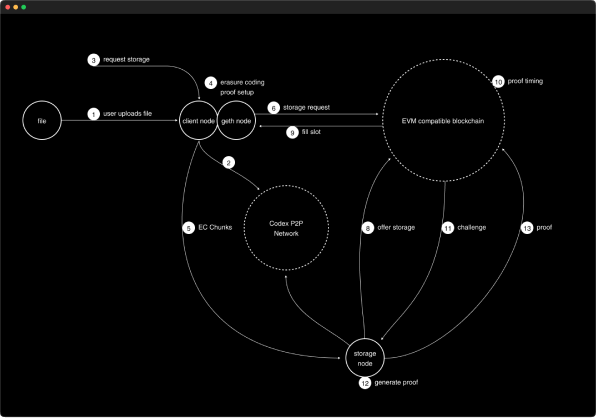Overview
The Challenge
The introduction of data sampling (‘data blob’) with the implementation of EIP-4844 is a step towards solving the scalability of the Ethereum Network, but dependence on external data availability introduces security risks for rollups and their dapp ecosystem.
Our Solution
Codex offers secure data storage and persistence for Ethereum, ensuring your data remains accessible and durable.
Overview
Storage Designed for Web3
Codex offers secure data storage and persistence for Ethereum, ensuring your data remains accessible and durable.Join the network
Visit the Project on GitHub and learn about community contributions.On GitHub
Visit the Project on GitHub and learn about community contributions.Join the network
Visit the Project on GitHub and learn about community contributions.On GitHub
Visit the Project on GitHub and learn about community contributions.Join the network
Visit the Project on GitHub and learn about community contributions.On GitHub
Visit the Project on GitHub and learn about community contributions.Network Architecture
Codex is composed of multiple node types, each taking a different role in the network's operation. Similarly, the hardware demands for each node type vary, enabling those operating resource-restricted devices to participate.

Grants
Codex ecosystem is looking to fund talented and eager developer teams that want to build the future of the web.
Logos Collective
Codex is powering the data storage layer of the Logos technology stack. Logos is a grassroots movement, building the infrastructure for trust-minimised, corruption-resistant governing services and social institutions for peaceful people worldwide.
Learn more about our ambitious vision.
Frequently Asked Questions
Codex is a state-of-the-art, decentralized storage protocol that provides a solution for highly durable data storage with high decentralization, aiming to resist censorship and prevent single points of failure inherent in centralized systems.
Unlike centralized systems, Codex is designed to offer data durability, resiliency to cloud failures, and censorship resistance, making it vital for use cases like preserving factual history records.
Where we're headed
Building a blockchain is like building a software rocket – it is fundamentally hard, and takes extraordinary care to ensure launch is secure and stable. Check out these resources to learn about Filecoin’s development progress and how the network is approaching some extremely challenging problems in cryptography, distributed systems, and beyond.